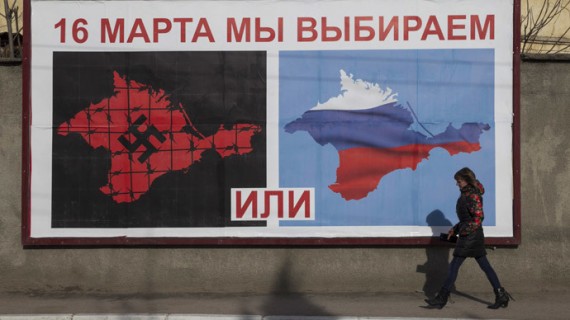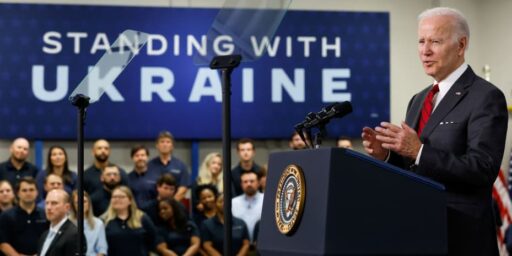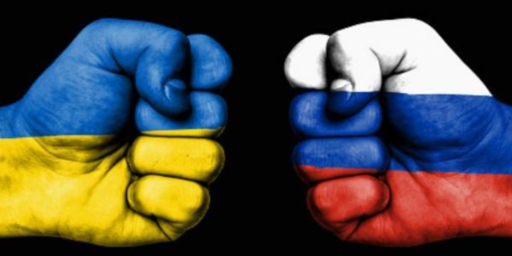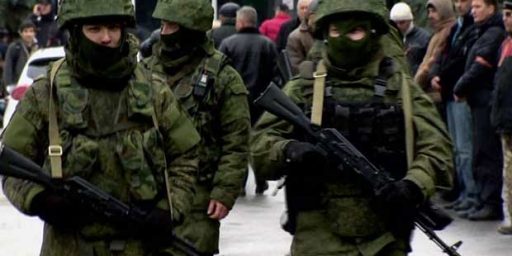Crimeans Endorse Secession, Union With Russia. What’s Next?
As everyone anticipated, the Crimean referendum came out in favor of secession from Ukraine and union with Russia. What happens next is another question entirely.
Exit polling indicates that the referendum in Crimea has come out overwhelmingly in favor of secession:
Simferopol (Ukraine) (AFP) – An overwhelming 93 percent of Crimeans voted Sunday to become part of Russia in a referendum deemed illegal by the new authorities in Ukraine and most of the international community, exit polls showed.
“Ninety-three percent of Crimean residents have supported the attachment of Crimea to Russia in the referendum. This is the data given by the exit polls,” Crimea’s pro-Moscow authorities said.
There was never really any doubt about the outcome of the separatist referendum in Crimea. Thanks both to the fact that the region is dominated by Russian loyalists and, of course, the presence of Russian troops and pro-Russian militia groups, it’s been clear from the start that the result would end up favoring secessi0n from Ukraine and union with Russia.
Nonetheless, now that it has happened, the parties involved, Russia, Ukraine, Europe and the United States, all find themselves at a crossroads. Europe and the U.S., of course, will reject the legitimacy of the referendum and, indeed, under the Ukrainian Constitution it is entirely illegitimate. Russia, meanwhile will cite is as justification for their move into Crimea and will likely take the opportunity to strengthen their military position.
The question is what happens next, and there are a number of factors that come into play there.
At the top of the list, of course, is what happens to Crimea. At least as a preliminary matter, the Ukrainians and the West are not going to accept the outcome of the referendum and there will be little desire in Kiev, Berlin (given that German Chancellor Merkel has been the primary voice of opposition in Europe), or Washington to simply back down and let the Russians take the peninsula. At least in the beginning, the desire will be to punish Russia for the events in Crimea via trade sanctions and other methods that likely will have at least some impact on the Russian economy, although one wonders how much they’d persuade Vladimir Putin to give up what he has seemingly won here. Even if Ukraine and the West do back down, though, the parties would still have to deal with what to do about those people who don’t wish to be part of Russia, as well as the several thousand members of the Ukrainian military and government located in Crimea. Additionally, the future of the rest of Ukraine, including those parts of eastern Ukraine that are dominated by ethnic Russians, will still have to be resolved.
Next, there’s the question of whether Russia’s ambitions extend beyond Crimea, and how the West would react to that.
There have already been some moves by the Russian military that suggest that it may be planning to move into some parts of eastern Ukraine beyond Crimea, for example. Additionally, some political leaders here in the United States have asserted that Putin’s desire is to reassemble the Soviet Union and the Warsaw Pact. Leaving aside the fact that much of this commentary sounds as paranoid and reactionary as the claims, sometimes made by the same people, that the worldwide Islamic Caliphate is just around the corner, the assertion itself ignores several political realities. There would be a significant difference, for example, between Russia asserting its influence in Ukraine (or in nations such as Belarus, Moldova, and Georgia), and its attempting to do the same in nations like Latvia, Lithuania, or Estonia. Not the least of those differences, of course, is the fact that the last three nations are NATO members and that Russian aggression addressed toward them would be treated far differently by the West than similar moves in Ukraine, or in Georgia in 2008. Whatever one might thing of Vladimir Putin, one has to admit that he’s at least intelligent enough to know that he’d be overplaying his hand if he were act toward those nations, or against the rest of Eastern Europe, in the same manner that he is acting toward Ukraine.
Finally, there’s the worst case scenario.
The one thing about the Ukrainian crisis that strikes me is the fact that everyone, no matter which side of the debate about Western intervention they happen to be on, seems to agree that this isn’t going to develop into some kind of shooting war. What if they’re wrong, though? What if the Ukrainians refuse to accept the Russian absorption of Ukraine and decide to fight, or if the Russians use violence in eastern Ukraine, staged or otherwise, as an excuse to make a move into that part of the country? Could we actually end up with a real shooting war in Central Europe? It seems unlikely, but then again 100 years or so ago it seemed unlikely that the death of an Austrian Archduke and his wife on a street in Sarajevo would lead to the bloodiest war that Europe had ever seen.







Putin can send the Russian army back into Afghanistan if he likes..
I don’t see there being a shooting war that we get directly involved with. We just don’t have enough at stake in the region. And a shooting war would be over very quickly without a massive intervention from the west.
A long occupation and freedom fighters engaged in asymmetrical warfare — or, terrorists we support morally and possibly with humanitarian assistance — is a very real possibility. It is in Russia’s best interest to perform a bit of quick ethnic cleansing, preferably with a carrot (relocation assistance to those on the wrong side of the border) than a stick.
Unfortunately people don’t always behave rationally. Putin is not behaving rationally in this case. He already had effective control of the Black Sea and of the Crimean ports that allow for that control. He will gain nothing net. Our sanctions will help to raise the cost. And Putin’s borders will become more militarized and possibly more dangerous. This was not a rational, profit-and-loss decision. It was the recklessness and haste of an egotist determined to show the world he still has a dick.
We will not be in a shooting war over Ukraine. But things can go south in a hurry when there are high emotions and guns involved. Yes, Russia can beat Ukraine, but unless it all goes perfectly it could easily create another Chechnya for Putin. A much bigger Chechnya.
This is a KGB thug we’re dealing with, not an EU bureaucrat. This is dangerous stuff that will very likely harm Russia, so can we at least drop the assumption of rationality? Rational people don’t cause international incidents and possible wars to take what they already have.
It also helps that they let Russian nationals vote in the referendum, because it might as well be Russia already.
http://www.newsru.com/world/16mar2014/krymvoterf.html
We need to roll tanks, because anything else is a sign of weakness and the Russian bear understands nothing but force. If we allow them to take Crimea, then the next step will be Kiev, then Warsaw, then Berlin, then Paris, then finally we’ll be manning the barricades on the Potomac.
We should follow the example of Saint Ronaldus, who responded to the bombing of the Marine barracks in Lebanon by leveling Lebanon and exterminating Hezbollah, who never challenged us or our allies again.
Wait, whut?
@michael reynolds:
But they may to keep what they fear losing.
@michael reynolds:
I’d be careful about not ascribing rationality to Putin. It seems he has ginned up his popularity in Russia and has taken the chance to crack down on his opposition at home. It’s not clear that the new government in Kiev could be relied upon to renew those bases in Crimea-especially if it’s bolstered by Western aid.
His view just might be to strike when Ukraine is weakest and most disunited and to grab what he could. This is after all what the USA did with Mexico in 1846 and that seemed to have worked out OK for the USA-if you overlook that one result was the little unpleasantness that began in 1861.
@michael reynolds:
I think it’s a mistake to characterize Putin as irrational just as much as it is a mistake to characterize the leadership of Iran is irrational. He’s acting in what he believes to be Russia’s national interests, and in this case that means protecting Russian access to the strategically important Crimean peninsula.
One can argue that he’s setting into motion a course of events that are going to turn around and bite him in the ass in the end, and perhaps that’s right. However, there’s clearly a rationale for what he’s doing as opposed to, say, Hitler, who was clearly acting irrationally when he decided for some reason to pause the war in the west in 1941 in order to try to do what Napoleon and Kaiser Wilhelm had both failed to do, conquer Russia.
@Doug Mataconis:
Maybe it comes down to different definitions of rationality. Ukraine has no capacity to threaten Russia’s bases in Crimea and they’d be mad to try. He seems to be taking Crimea not because he needs Crimea (he already had it, in effect) but as a reaction to Ukraine overthrowing a government that would have made Ukraine subject to Russia. He just invaded and took millions of pro-Russian voters out of the Ukrainian political system, tilting Ukraine more toward the West. Why? How does that make logical sense? Wouldn’t the logical move be to diplomatically woo Ukraine and its people?
And he’s ginning up the propaganda machine to make it seem Ukraine is a hair away from National Socialism. Why? What rational goal does this further? Where’s the profit? Unless of course he intends on going further and taking at least eastern Ukraine. And again, why?
The net effect is to say, This is what happens when you don’t belong to NATO. What he’s accomplished is frightening all of his neighbors and, by the way, making ethnic Russians suspect in the countries they live in. Is there a logical reason to do that? I don’t see it.
the people have spoken, what’s the problem? how can the west make anymore lame threats over something that the citizens of crimea want?!
putin has 3 aces, the west has a pair of 2’s and ukraine folded- and that’s just at “the river”.
Perhaps there should be a significant difference, but will there? Would the US and Western Europe be willing to go to war with Russia over the Baltic states?
@michael reynolds:
It’s perfectly rational. It’s called Salami Tactics. A great example from Yes, Prime Minister, that deals with nuclear war specifically, but illustrates the same basic issue we have here:
http://www.youtube.com/watch?v=IX_d_vMKswE
@Stormy Dragon: “Would the US and Western Europe be willing to go to war with Russia over the Baltic states?”
It seems like you answered your question. But what it looks like is that the West wasn’t willing to go to war for the Baltic states, or even Poland, but by extending NATO membership they created a hostage situation, where they have no choice but to defend them. If one NATO state falls uncontested, then its time to cut the salami, no?
@PD Shaw:
Sure they have a choice. If Russia invades the Baltic States and the rest of NATO does nothing, is Estonia going to return to the store and demand their money back or something?
Part of what makes me less than sure that NATO will actually defend them is that they don’t seem to be making preparations to do so. If Russia invaded the Baltic states, they’d fold almost immediately without significant outside military support. Yet the rest of NATO, as things currently stand, would require months of preparation to be ready to provide such aid.
Doug, to write a headline like that, you really ought to be demanding a paycheck directly from Putin. The only options the referendum had for voting were ‘join Russia NOW’ or join Russia LATER”. There literally WAS NOT an option for ‘stay part of Ukraine’. This ‘referendum’ was, quite literally , no more legitimate than North Korea’s recent vote where ‘100%’ kept Kim Jon Il in power. This was garbage, and any pretense at its being legitimate is a bad joke.
@michael reynolds:
Mike, please read this:
http://conversationsatstanleypark.wordpress.com/2014/03/15/lord-salisburys-lessons-for-great-powers/#more-1025
We should not be having State Dept people handing out cookies to protesters in sensitive places. Here is a view of how Russians feel about it:
http://www.testosteronepit.com/home/2014/3/10/from-now-on-no-compromises-are-possible-for-russia.html
It’s true, we promised no NATO in the old Soviet bloc.
I think Russia has always felt that the Crimea “is part of us.” Particularly because of the high Russian population there. They’re not so possessive about the rest of the Ukraine, especially if it looks like trying to annex it (again) is just going to produce another Chenya.
I don’t think this is a case of Putin trying to drag the rest of Russia along with an idea–it was a case of a mob milling around and he ran over and proclaimed he was the head of it.
Given that 24% of Crimeans are ethnically Ukrainian and 12% are Tatars, 93% in favor of secession sounds ridiculously high for anything approaching a fair election. This is one short step more realistic than the reelection of baby Kim.
Doesn’t matter whether it’s realistic or a sham (though I think this particular result is a sham, I wouldn’t be at all surprised if more than 50% in an honest election wanted to join Russia). With the Ukraine military and government refusing to abandon their bases in the Crimea, they are THIS close to an “incident” (manufactured or otherwise) that will allow Putin to declare war and snap off a lot more territory (if not all of the Ukraine). Which I think would be a mistake on Russia’s part (they don’t need another Chechnya, which is what they’ll get, in addition to all the anger and fear they’ll cause in Europe forcing people to ally against them), but I don’t think Putin wants to stop at the Crimea. They’ll want a land route connecting it to Russia if nothing else. Ukraine’s leaders have a hellish choice: submit and let Russia get the Crimea and eastern Ukraine, or fight and get the whole country occupied. Which, in turn, would force the US and Europe into choices with no good options, just bad and worse.
And just to make things worse, Russia is ready for war, Europe (and the US, I’m afraid) is not. Their logical response (no matter what Russia does next) will be to think about their defense posture, readiness, etc…but that will take time to improve/adjust. So time is not on Russia’s side if they really want to go after the Baltics, the -stan’s, or other nations spun out of the old USSR. Which might just encourage them to be MORE aggressive, and if the West doesn’t have the conventional forces in place to stop him (and we don’t, short of the German border)…
While I dismiss most historical parallels like appeasement as absurd, one that does frighten me is how before WWI no one serious thought it would really end up in a shooting war. Each side just thought they had to “project” enough “strength” to intimidate the other into backing down. That sort of hubris is insanely dangerous right now.
@Just Another Ex-Republican: